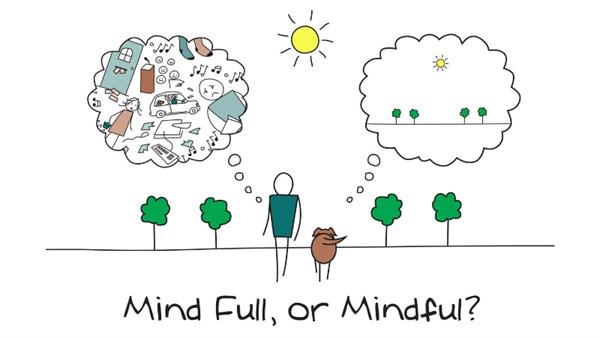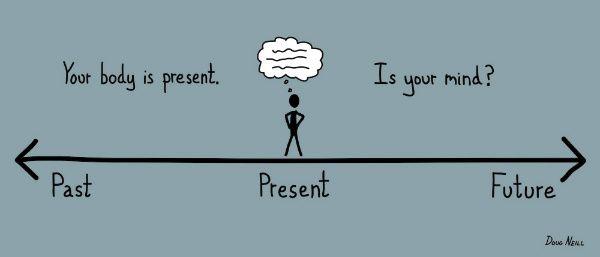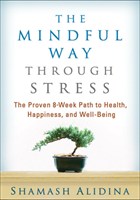The mindful way through stress
26 Jan 2015 | Shamash Alidina

Mindfulness is both a set of techniques and way of living that
makes you more focused, calm and creative. The approach includes
not only meditations but also offers a way of paying attention to
your everyday activities, making yourself more centred, grounded
and balanced.
Mindfulness meditation differs from other meditation techniques
because it focuses on your present moment experiences rather than
repeating a mantra in your head or visualising yourself in some
distant relaxing place.
Mindfulness can help you reduce stress by developing a new level
of awareness of:
- the thoughts that trigger your stress
- the emotions (yours and others') that can bubble into
conflict
- the physical signs that your body is excessively stressed
- the behaviours that might contribute to heightened stress and
also those that help you relax
There are many ways to learn mindfulness. I'd recommend you
check out the mindfulness-based stress reduction approach. Mindfulness-based stress reduction (MBSR) is
an eight-week mindfulness course originated in 1979 and usually
done in a group setting with an MBSR teacher that has now been
completed by hundreds of thousands of people.
MBSR is the most well-researched mindfulness course in the
world, so it makes sense to start there if stress is a problem for
you. The latest exciting brain science is showing powerful positive
changes that take place in those that practice MBSR. Benefits
include a more powerful immune system, improved communication,
reduced stress and an improved ability to focus.
The aim of the course is to teach a range of different
mindfulness exercises and meditations to help reduce your stress in
the long term. The course also offers a chance to explore mindful
attitudes and values so you can meet future life challenges in a
way that reduces rather than increases your stress.
Finally, MBSR offers you a way of living so you can notice and
take pleasure in the simple things in life that we all take for
granted, and, in doing so, focus on what's going well in your life,
not just what's going wrong--no matter how bad things seem to
be.
When Dr. Jon Kabat-Zinn and colleagues at the UMASS Medical
School designed MBSR, the goal was to make the benefits of
traditional Buddhist mindfulness meditation accessible in a secular
way to people suffering from chronic pain and other long-term
health conditions. The program was designed to include not only
mindfulness meditation but also yoga, models about stress, group
discussion, and ways of integrating mindfulness into daily
life.

One of my clients, Sarah, was suffering from lots of stress due
to a recent divorce and the challenge of looking after her mother.
She turned to mindfulness in the hope to find some peace. As Sarah
began to practice mindfulness exercises, she became more aware of
how wild her mind was. All kinds of thoughts, many unconnected to
what she was attempting to focus on, entered and exited her
mind.
She also noticed how negative many of these thoughts were: "'I'm
useless" and "What's wrong with me?" and "I can't cope with this
job and all the other stuff going on." These thoughts kept going
around and around in her head. Through mindfulness, she learned to
step back from the thoughts in her mind so that they gradually had
less of an impact on her feelings of stress.
Sarah also felt less tired at work due to an improved ability to
focus, and so managed to work more efficiently and leave the office
earlier. In the evenings, when she got home from work, she did a
short mindfulness exercise. This helped her shift out of work mode
and be more calm and relaxed at home. She learned not to feel so
guilty when doing nothing - just sitting down and resting, or
playing with her son, was okay, she realized. In fact, it was
essential.
Everyone has a wild mind. We all overreact to the demands of our
lives when stretched to our limits. Our world collapses in on
itself and we lose empathy for others who are struggling just as we
are when stress has us in its grip.
Fortunately, we need not lose hope that things can get better.
Sarah's story illustrates that, if you practice, mindfulness can
slowly and steadily soothe your mind and heart, positively
nourishing all parts of your life. It's a bit like gentle rain
soaking into a land of drought. The rain is mindfulness. The
drought is the constant doing of modern living.

I'm going to share with you a few mindfulness exercises from the
mindfulness-based stress reduction program for you to try out.
You'll find them much easier to do with a guided audio, but you can
make do with these brief descriptions if you wish:
- Mindful eating. Take a small piece of fruit
and take about five minutes to savour it. Go through each sense for
a minute and cultivate a feeling of curiosity. Notice the exact
shades of colour of the apple, take time to enjoy the scent, close
your eyes to become aware of what it feels like to hold this small
piece of food in your hand. Rejoice in the wild range of flavours
as you slowly chew and eventually swallow the fruit in your mouth.
This process gives you a great introductory experience of what
mindfulness is about.
- Mindful body scan meditation. Lie down on your
back with your arms and legs stretched out. Take anywhere from five
to 30 minutes going through the sensations in your entire body,
from the tips of your toes to the top of your head. Your mind will
wander off to all sorts of thoughts hundreds of times. Each time
you notice that, acknowledge and bring your kind attention back to
whatever body part you were focusing on. Be as patient with
yourself as you can.
- Mindful walking. The next time you're walking
to work, the shops or wherever you're going, try this exercise:
just focus on the process of walking and breathing. So take off
your headphones, set aside your mental to-do list and just walk.
Notice the feeling in your feet as you take each step. Bring a
sense of inquisitiveness. Which part of your foot touches the
ground first? How fast are you breathing? Do you breathe from your
nose or mouth as you walk? Are your shoulders or jaw tense as you
move? Just being aware of this bodily experiences cultivates
greater mindfulness and can be a welcome change to the constant
rushing of our lives.
- Mindful breathing. Simply take a few minutes
everyday to feel the physical sensation of your own breathing with
a sense of affection and warmth. Each time your mind wanders off,
gently and kindly bring your attention back to the breath. Sounds
overly simple, but can be tremendously soothing with practice. The
more you can feel your breath with kindness, the more you'll enjoy
the process and the less your mind will jump about. And you can do
the exercise anywhere, so it's even more portable than your phone -
you can't leave your breath at work when you're going home!


The Mindful Way Through Stress acts as a
friendly self-help guide, taking you through the evidence-based
eight-week mindfulness-based stress reduction course, along with
guided audio. The book is available to purchase from Amazon and
other good bookshops.
Shamash
Alidina is bestselling author of seven books on mindfulness,
also including Mindfulness for Dummies. He offers online
mindfulness training and teacher training. His approach is to teach
mindfulness with compassion - turning mindfulness into
kindfulness.